SSL Checker Tool
The security of your website is vital to the success of your Internet business. One way you can protect your data (and your customers) is through the use of encrypted communication protocols. Secure Socket Layer (or SSL) was the original method of providing for basic encryption between servers and clients. The industry mostly uses Transport Layer Security (or TLS) protocols now, but the process is basically the same, and most users refer to this kind of encryption by the old name: SSL. As part of our Web Hosting Toolkit, Liquid Web provides and SSL Tool to help you verify that your SSL is installed correctly and up-to-date. Below is an insight on how to use this tool and as well as some core concepts and certificates types to know when dealing with SSL.
SSL Certificate Checker
You’ll want to confirm that everything is functioning correctly on the server once you’ve successfully ordered and installed your SSL. At this time, you’ll want to check on your domain SSL’s to confirm expiration dates, covered subdomains, or other information. While you can use various third-party SSL checkers on the Internet, Liquid Web makes gathering this information about your domain simple. Just go to the Liquid Web Internet Webhosting Toolkit page and click on SSL Tool.
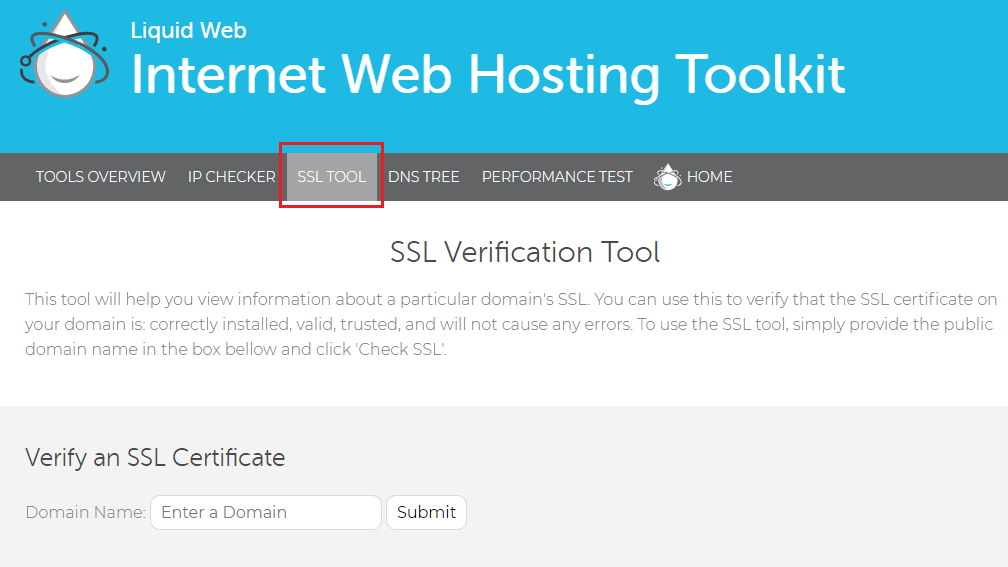
How Do I Check If My SSL Certificate is Valid?
Enter your domain name in the box provided and click on Submit. You can enter either your primary domain name (like mydomain.com) or any of the subdomains you may have created SSL certificates for (like blog.mydomain.com). If an SSL certificate is installed on the server for the domain, the page will display the status of the certificate and additional information.
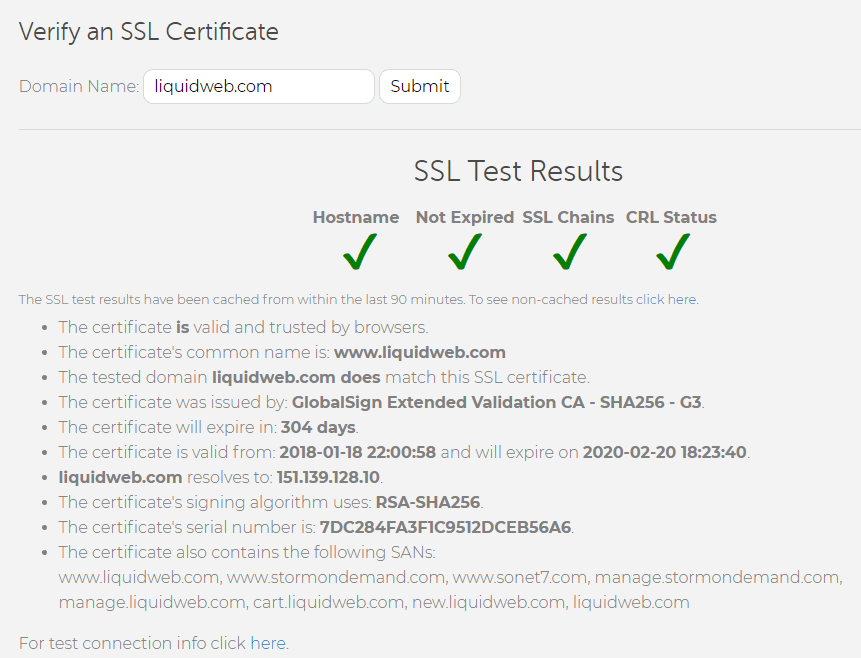
In this example, you can see that the certificate is valid and trusted by browsers and that the tested domain matches the certificate.
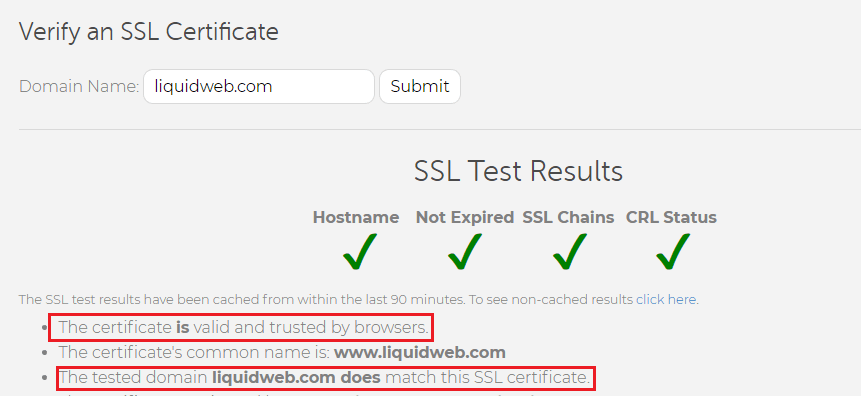
You can also see which Certificate Authority issued the certificate and the dates for which the certificate is valid.
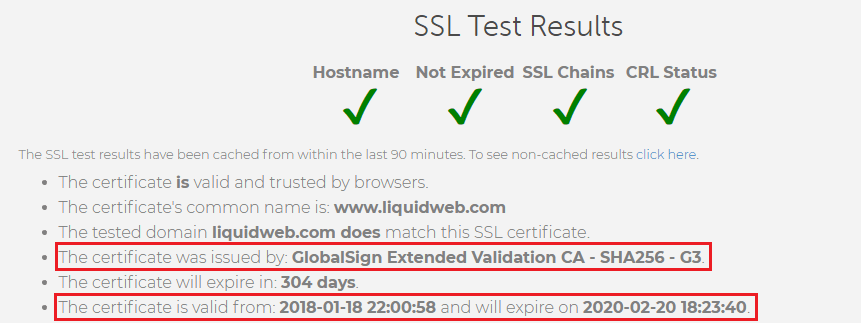
Finally, you can see which signing algorithm was used to generate the certificate (indicating how complex and secure the certificate is) and which domains and subdomains are covered by the certificate.
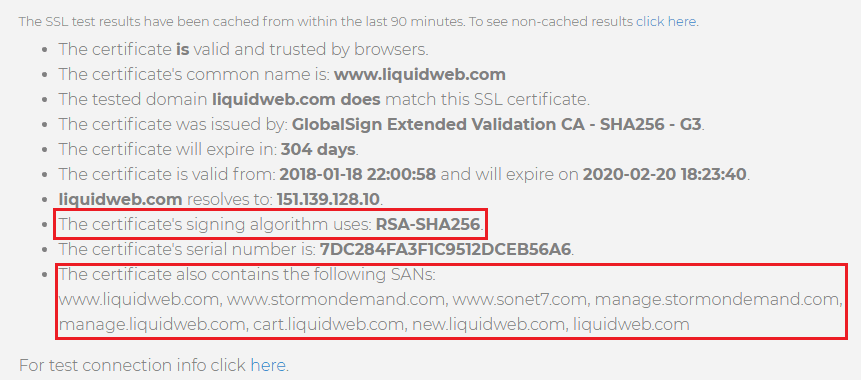
How SSLs Work
SSL connections work through a series of tools that exist on your server and on a client’s web browser. At the simplest level, the server and a client computer exchange information and agree on a secret “handshake” that allows each computer to trust the other computer. This handshake is established through the use of private and public SSL certificate keys. The private key resides on the server, and the public key is available to a client computer. All information passed between the computers is encoded and can only be decoded if the keys match. These keys are generated by a Certificate Authority (like GlobalSign) and can vary in complexity and expiration date. These matched keys exist to prevent what are known as “man in the middle” attacks when a third-party intercepts the Internet traffic for the purpose of stealing valuable data (like passwords or credit card information). Because the third-party doesn’t possess the matching keys, they will be unable to read any of the intercepted information.
By using a trusted certificate, your website users can enter their information with full confidence that their data is safe. Certificate Authorities only grant SSL certificates to operators who can prove that they are the legitimate owner of a domain and that the domain is hosted on the server for which the certificate is being issued. This proof is usually obtained by modifying the DNS records for a domain during the verification process of the certificate ordering transaction. To learn more about how to order an SSL through your Liquid Web account, see How To Order or Renew an SSL Certificate in Manage.
Types of SSL Certificates
While SSL certificates all provide the same essential functions, there are several different types of certificates to choose from. You’ll want to establish which certificate meets your needs before you decide to order one for your domain. The types we’ll discuss here are Self-Signed Certificates, Standard Domain Certificates, Wildcard Certificates, Extended Validation Certificates.
Self-Signed Certificates
Most servers have the capability of generating a Self-Signed SSL certificate. These certificates provide the same kinds of encrypted communication that certificate provided by Certificate Authorities provide. However, because they are self-signed, there is no proof that the server is the “real” server associated with a website. Many control panels use self-signed certificates because the owner of the server knows the IP address of the server and can trust that they are connecting to the correct site when using that IP address. The advantage of self-signed certificates is that they are easy to generate and are free to use for as long as you want to use them.
Standard Domain Certificates
If you only need to secure a single domain or subdomain, a standard domain SSL certificate is appropriate. Standard certificates are generally the least expensive option from Certificate Authorities and are designed to cover one domain or subdomain (generally both domain.com and www.domain.com are covered by a standard certificate).
Wildcard Certificates
If you have multiple subdomains, you may be able to save time and money by getting a wildcard SSL certificate. Wildcard certificates cover a domain and all of its subdomains. For instance, if you have a domain website that also has a mail subdomain, a blog, a news site, and a staging site that you want to be protected by SSL communication, a single wildcard would protect all of the sites.
Extended Validation Certificates
SSL certificates are generally issued to companies that can prove they have the right to use a domain name on the Internet (normally because they can modify the DNS records for that domain). While that level of verification is sufficient for most companies, you may need to have additional evidence that your company is a reliable entity for business purposes. Organizational SSL certificates require additional vetting by a Certificate Authority, including checks about the physical location of your company and your right to conduct business. Organizational SSL details can be visible on your website if you install a Secure Site Seal. Additional vetting is available for companies that choose Extended Validation SSL certificates. Extended Validation processes are often used by banks and financial institutions to provide extra reassurance to their customers that their website is legitimate.
If you need help determining which type of SSL is right for your business, chat with our Solutions team for additional information.
Now that you’ve checked the details of your SSL certificate and confirmed that all of the information is correct, you’ll be sure that the communications between your server and your customer’s computers are secure as that information travels over the Internet. For more information about improving the overall security of your server, see Best Practices: Protecting Your Website from Compromise.
Related Articles:

About the Author: David Richards
David Richards has been an educator, a Technology Director, and now a Windows Administrator for 20+ years. He’s an English major with a love for technology and helping others find ways to use technology more effectively. In his free time, Dave loves to read, play games, and spend time his family.
Our Sales and Support teams are available 24 hours by phone or e-mail to assist.
Latest Articles
Managed Server vs. Unmanaged Server Defined
Read ArticleChange cPanel password from WebHost Manager (WHM)
Read ArticleChange cPanel password from WebHost Manager (WHM)
Read ArticleChange cPanel password from WebHost Manager (WHM)
Read ArticleChange the root password in WebHost Manager (WHM)
Read Article


